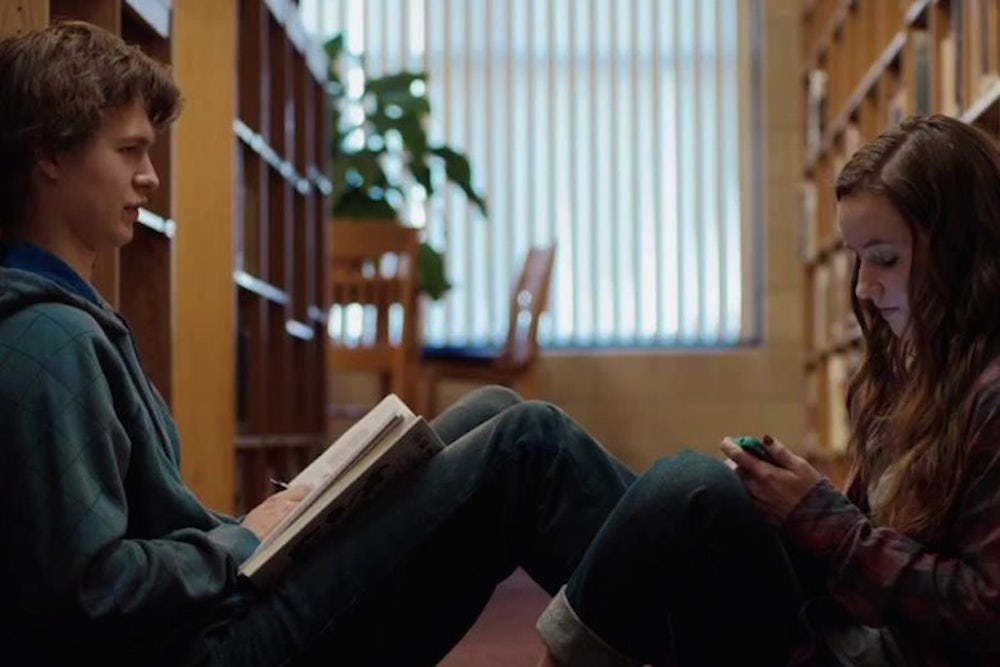Men, Women, & Children is not a movie, but you’d be forgiven for finding it to be a convincing imitation. After all, it was made with a movie camera, it features a slew of movie stars, and it will play in movie theaters. But what is there that’s moving in this thing? Its characters, its story, its emotions, its themes are dead on arrival, pinned to the screen like a specimen under a lens. This is no ordinary bad movie—instead Men, Women, & Children is the latest of the cinematic thinkpiece new wave, a food-for-thought lesson in didacticism that, in its attempt to capture the multiple dimensions that technology adds to our lives, ends up seeming more like a flat morality tale.
Since his debut with Thank You For Smoking and his career-making sophomore feature Juno, director Jason Reitman has tried to make films with their finger on the pulse of the cultural id. In some cases, it has worked. Juno’s homey quirk looms large over the Sundance set to this day, and though his 2011 film Young Adult was only a modest success when it was released, its sociopathic protagonist proved prescient of the wave of thorny women that would follow in the years to come, from Lena Dunham’s “Girls” to Jenji Kohan’s “Orange Is the New Black.” With Men, Women, & Children however, Reitman’s trendiness has backfired so spectacularly, it’s tempting to look back at those successes and retroactively deem Diablo Cody their sole creator. The technologically-themed vignettes at the heart of Men, Women, & Children are hopelessly dated, featuring a social media panic that would have been leery in the pre-Facebook ages, but which now seems so foreign that the whole endeavor might almost pass as a parody.
Reitman’s story of interconnected lives in the suburbs positions technology as the grand facilitator for all human discontent, as its six main plots run the gamut of internet’s woes from anorexia to xenophobia. He’s got his thesis underlined as if it were a freshman term paper based on an interpretation of Carl Sagan’s Pale Blue Dot—the universe is empty and meaningless, dontcha know? Get off your phones and enjoy life! As our narrator, Emma Thompson does what she can to save Reitman from his own earnestness, but once the firm irony of her narration fades into narrative proper, we’re stranded with straw men characters who become internet scarecrows.
It’s an airless two hours that feels even longer because of the proliferation of familiar suburban clichés. Will Jennifer Garner learn a painful lesson about the consequences of parental surveillance? Will Ansel Elgort’s misfit find love with teen rebel Kaitlyn Dever? Will Judy Greer and her ambitious daughter get their comeuppance? Will spouses Adam Sandler and Rosemarie DeWitt’s find out about each other’s infidelity?
In a word? Duh. But Men, Women, & Children treats every foregone conclusion as if it were a groundbreaking revelation. Even weirder, it treats every storyline as if it were wholly unique to the modern age of technology, as if men weren’t arranging rendezvous with prostitutes and women weren’t distorting their body images long before the iPhone came around.
It’s not just the resistance to technology that makes Men, Women, & Children seem so archaic—what’s the point of technological panic if it’s not just a façade for sexual anxiety? Look past the Tumblr page and each one of Reitman’s little stories becomes its own afterschool special. Don’t have casual sex! Don’t watch too much porn or you won’t enjoy the real thing! Don’t put sexy pictures on the internet!
I’m tired of watching conservatism wear the mask of concern. Antiquation is not empathy. Men, Women, & Children curates the world of technology into a tiny sliver of only the most outlandishly evil elements, and pretends that perspective is reason for despair. In Reitman’s world, the only positive outcome the internet has to offer is in a straight teen outsider romance—a romance we’ve seen idealized in movies again and again, and it is, of course, this utterly conventional connection that the film holds up as the great hope for the future of humanity.
There is one shot over a shopping mall, as people mill around and around, not interacting, their phones shining blue light on their faces, their screens superimposed like signs over their heads, that suggests what Men, Women, & Children might have looked like if it had any interest in being a movie instead of a Scared Cyber-Straight lesson. Maybe it would have resembled last year’s thriller The Bling Ring, which featured its own more nuanced and compelling critique of technology’s growing role in our culture. Both are films aiming to make statements about the state of the world, but The Bling Ring involved not just thematic ambiguity and clear, unified narrative, but devices that belong to the cinema alone—camera movement, montage, light, color. But the camera in Men, Women, & Children is as mindless as the script. Scene after scene unfolds in muted digital brown, with the action happening in iOS 7-esque text floating over the actors’ heads. Men, Women, & Children was based on a book by Chad Klutgen, and while the movie engenders no goodwill for its source material, its fidelity seems beyond reproach—this team was so faithful, they barely even bothered to make a film at all.
